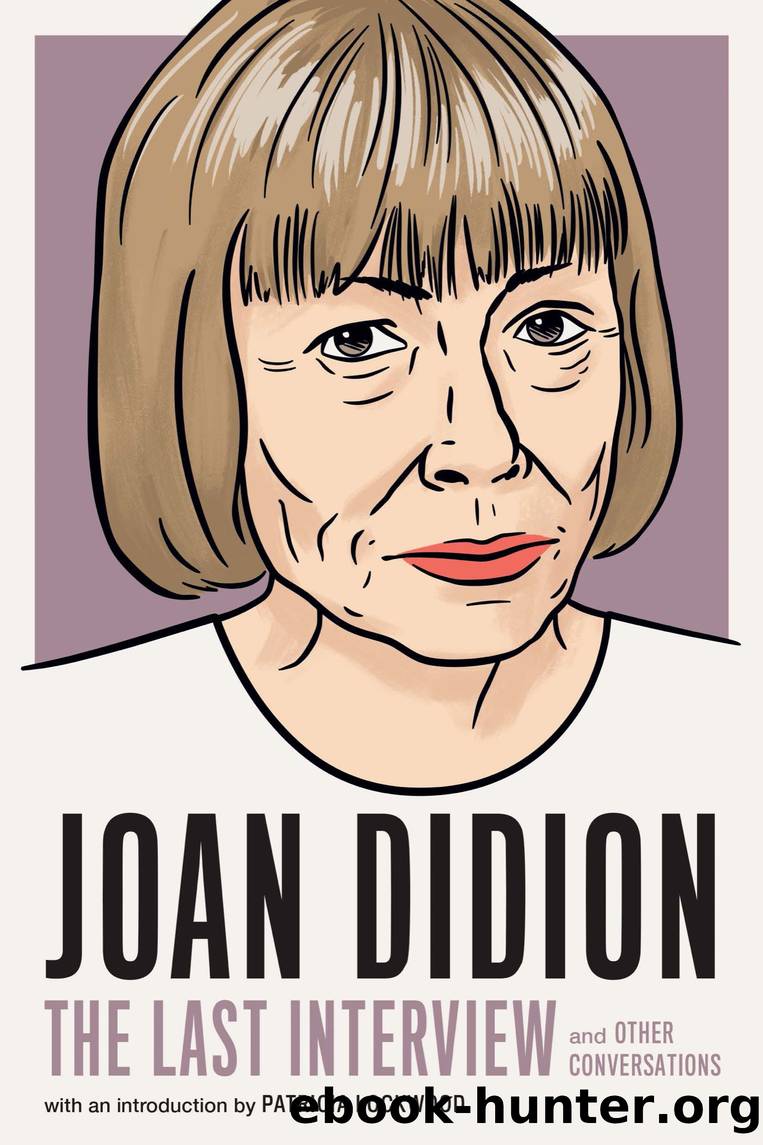Joan Didion by The Last Interview & Other Conversations (Melville House 2022)

Author:The Last Interview & Other Conversations (Melville House, 2022)
Language: eng
Format: epub
Publisher: Melville House
Published: 2022-06-28T00:00:00+00:00
THE ART OF NONFICTION NO. 1
INTERVIEW BY HILTON ALS
THE PARIS REVIEW
SPRING 2006
The last time this magazine spoke with Joan Didion, in August of 1977, she was living in California and had just published her third novel, A Book of Common Prayer. Didion was forty-two years old and well-known not only for her fiction but also for her work in magazinesâreviews, reportage, and essaysâsome of which had been collected in Slouching Towards Bethlehem (1968). In addition, Didion and her husband, John Gregory Dunne (who was himself the subject of a Paris Review interview in 1996), had written a number of screenplays together, including The Panic in Needle Park (1971); an adaptation of her second novel, Play It as It Lays (1972); and A Star Is Born (1976). When Didionâs first interview appeared in these pages in 1978, she was intent on exploring her gift for fiction and nonfiction. Since then, her breadth and craft as a writer have only grown deeper with each project.
Joan Didion was born in Sacramento, and both her parents, too, were native Californians. She studied English at Berkeley, and in 1956, after graduating, she won an essay contest sponsored by Vogue and moved to New York City to join the magazineâs editorial staff. While at Vogue, she wrote fashion copy, as well as book and movie reviews. She also became a frequent contributor to the National Review, among other publications. In 1963, Didion published her first novel, Run, River. The next year she married Dunne, and soon afterwards, they moved to Los Angeles. There, in 1965, they adopted their only child, Quintana Roo.
In 1973, Didion began writing for The New York Review of Books, where she has remained a regular contributor. While she has continued to write novels in recent decadesâDemocracy (1984) and The Last Thing He Wanted (1996)âshe has increasingly explored different forms of nonfiction: critical essay, political reportage, memoir. In 1979, she published a second collection of her magazine work, The White Album, which was followed by Salvador (1983), Miami (1987), After Henry (1992), Political Fictions (2001), and Where I Was From (2003). In the spring of 2005, Didion was awarded a Gold Medal from the American Academy of Arts and Letters.
In December of 2003, shortly before their fortieth anniversary, Didionâs husband died. Last fall, she published The Year of Magical Thinking, a book-length meditation on grief and memory. It became a bestseller, and won the National Book Award for nonfiction; Didion is now adapting the book for the stage as a monologue. Two months before the bookâs publication, Didionâs thirty-nine-year-old daughter died after a long illness.
Our conversation took place over the course of two afternoons in the Manhattan apartment Didion shared with her husband. On the walls of the spacious flat, one could see many photographs of Didion, Dunne, and their daughter. Daylight flooded the book-filled parlor. âWhen we got the place, we assumed the sun went all through the apartment. It doesnât,â Didion said, laughing. Her laughter was the additional punctuation to her precise speech.
Download
This site does not store any files on its server. We only index and link to content provided by other sites. Please contact the content providers to delete copyright contents if any and email us, we'll remove relevant links or contents immediately.
Hit Refresh by Satya Nadella(8345)
When Breath Becomes Air by Paul Kalanithi(7273)
The Girl Without a Voice by Casey Watson(7271)
Do No Harm Stories of Life, Death and Brain Surgery by Henry Marsh(6343)
A Court of Wings and Ruin by Sarah J. Maas(6114)
Hunger by Roxane Gay(4234)
Shoe Dog by Phil Knight(4183)
Everything Happens for a Reason by Kate Bowler(4076)
A Higher Loyalty: Truth, Lies, and Leadership by James Comey(4041)
The Rules Do Not Apply by Ariel Levy(3914)
Tuesdays with Morrie by Mitch Albom(3841)
The Immortal Life of Henrietta Lacks by Rebecca Skloot(3833)
How to Change Your Mind by Michael Pollan(3688)
Millionaire: The Philanderer, Gambler, and Duelist Who Invented Modern Finance by Janet Gleeson(3576)
All Creatures Great and Small by James Herriot(3527)
Elon Musk by Ashlee Vance(3461)
Tokyo Vice: An American Reporter on the Police Beat in Japan by Jake Adelstein(3441)
Man and His Symbols by Carl Gustav Jung(3326)
The Money Culture by Michael Lewis(3291)
